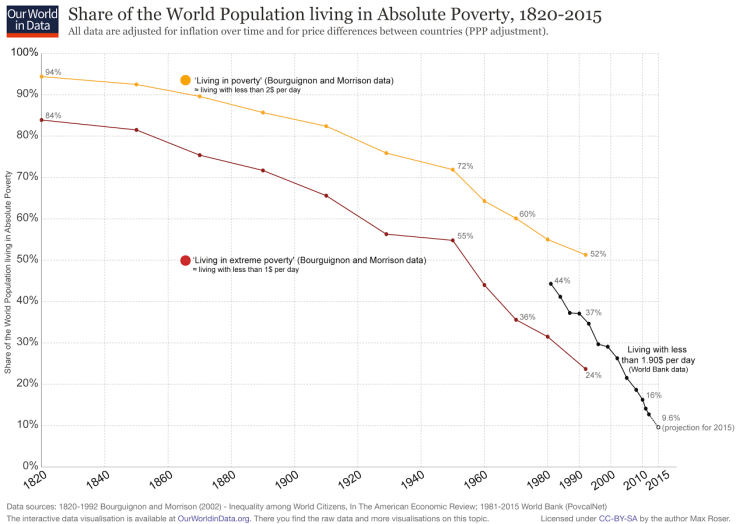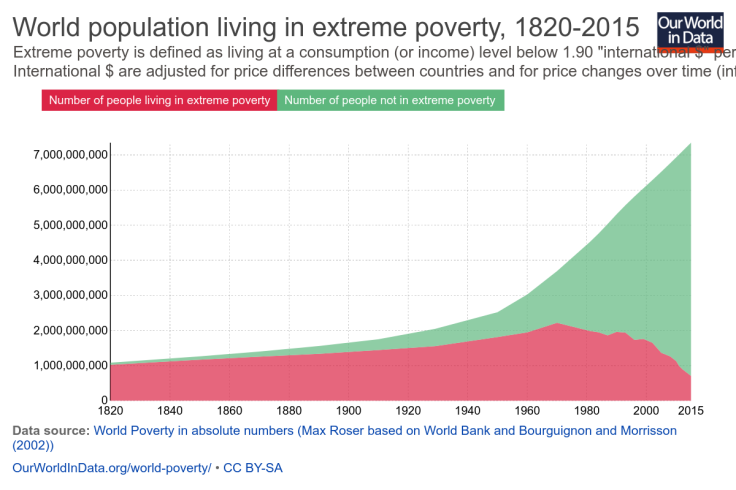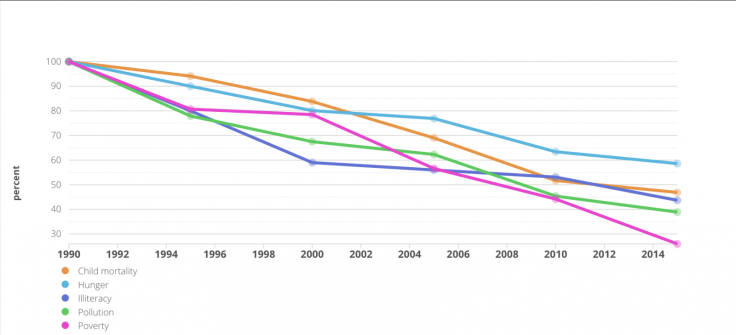Billionaires getting richer doesn't mean someone else getting poorer
Only 12% of Brits realise that the number of people in extreme poverty has fallen.
It's January so it's that time of year when various left-wing campaigning groups, some of which have charitable arms for branding purposes, release their killer statistics that show that the world is crueller and more unfair than ever before.
Today it was Oxfam's turn, with its annual release showing that a handful of tech billionaires own more in assets than half the world's population combined. The implication is that life is getting worse and worse for the bottom half of the world, because robber barons like Bill Gates and Mark Zuckerberg are getting richer and richer.
It's almost totally wrong. Life is getting much, much better for the world's poor, however you want to measure it – whether it's in terms of average incomes, life expectancy, child mortality, disease, poverty, or women's rights. Inequality between poor and rich countries is falling, and even inequality here in the UK has fallen to its lowest level in thirty years. (Do click that link for proof – nobody believes me when I tell them, but it's true.)
Oxfam's numbers come from estimating the number of people in debt and who don't own any assets. That includes lots of Westerners who aren't poor by any real stretch of the imagination even though they owe money to a bank somewhere. Hell, if you have a Harvard MBA and a six-figure income to go with it, but a lot of recent student loans as well, you're part of Oxfam's bottom half. On the other hand if you own a semi-detached home in London you're quite likely to be Oxfam's top 1%. This isn't actually the best argument against Oxfam's numbers, because these people make up a small fraction of the 'asset poor' people we're looking at, but it's worth noting all the same.
This all muddies the waters a little, so Oxfam sticks to the big shots: The Oxfam's PR team, because these guys are for the most part household names for creating immensely valuable products that most of us use on a daily basis. Like using Facebook to keep in touch with old friends? Me too – and it doesn't bother me that the man who invented it has made a lot of money in the process. Windows isn't perfect, but I don't mind that Bill Gates has made a lot out of it. And though I always find it a little weird that the founder of Zara is the second richest man in the world, if other people can fit into their slim-fit offerings, more power to him.
And of course all these people have created jobs, paid lots in taxes, and in the case of Bill Gates donated tens of billions of dollars to charity – more than Oxfam has raised in its entire history, by the way. And that's great. But even this is not really the point – these people have made their contribution by coming up with new products and ways of doing business that let people buy and do things that matter to them more cheaply and easily than before. They wouldn't be billionaires if they hadn't created products of enormous value, and it's the products themselves that really count in making the world better.
But the real story has nothing to do with these guys. As we at the Adam Smith Institute keep saying, once we accept that getting rich doesn't have to mean someone else getting poor, you quickly realise that it's not the wealth of the people on top that matters but the welfare of people at the bottom.
Here are two graphs, from Oxford University's Max Roser, of absolute poverty over the last two hundred years. It falls steadily from the early 19th Century (thank the Industrial Revolution for that) but starts falling like a stone from around 1980 onwards. That's the beginning of the neo-liberal era, when third world countries like China, India and Vietnam decided to try something other than socialism and opened up their markets instead.


Maybe you think there's more to life than money. You're right. When we measure things like child mortality, hunger, illiteracy and pollution – and take a minute to read back over those words and think about what they really mean, to the people who suffer from them, and how devastating any one of them would be to you if you experienced them – when we measure things like this we find that they've fallen enormously from where they were just 26 years ago.

Not all of this was because of markets! This isn't a hardcore free market argument, as much as I like making those. It's an argument that the world is getting better, and where these advances have been made because of government or technology it's because markets have created the wealth for governments to tax and created the incentives and resources for innovators to come up with their life-improving inventions.
But it matters, because thanks to groups like Oxfam people are deeply misinformed about the reality of global poverty. Just 12% of Brits realise that the proportion of the world population living in extreme poverty has fallen over the past 30 years. 55% think it has increased.
I'm fed up with people denying inconvenient truths. Climate change is happening; immigrants aren't stealing our jobs; neo-liberalism is making the world's poor better and better off.
It's probably too much to expect organisations like Oxfam to spend its money actually helping the world's poor. If you want to give to a charity that does so in a cost-effective way, consider supporting some of GiveWell's top-rated charities. But it shouldn't be too much to ask Oxfam to tell the truth about the trajectory of global poverty, and admit that it's neo-liberalism, not left-wing agitprop, that is doing most of the heavy lifting.
Sam Bowman is executive director of the Adam Smith Institute, a libertarian think tank. Follow : @s8mb
© Copyright IBTimes 2025. All rights reserved.






















